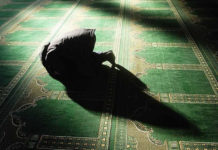Islam prescribes certain manners and traits for every Muslim to adorn his / her character. Some of these are:
- Truthfulness: Abdullah Bin Masud narrated that the Prophet (peace be upon him) said, It is obligatory for you to tell the truth, for truth leads to virtue and virtue leads to Paradise and beware of telling of a lie for telling of a lie leads to obscenity and obscenity leads to Hell-Fire… [Sahih Al-Bukhari and Sahih Muslim]. Hence, truthfulness is a praiseworthy virtue and people should adhere to it. They should not say that, The conditions forced me to avoid speaking the truth, since truth is salvation and this is borne by experience as well. For example look at the story of Kab Bin Malik about whom the following verses were revealed:
- Trustworthiness (Amanah): An obligatory quality of character is trustworthiness and being untrustworthy and treacherous is forbidden (haram). Deceiving Muslims, cheating them and not returning what they entrusted you with or lent to you is forbidden by the Quran, Sunnah and the consensus of Muslim scholars. Allah says, Verily! Allah commands that you should render back the trusts to those, to whom they are due [Al-Nisa 4:58]
- Purity and Chastity:A person should be pure in everything that the word pure can be applied to. He should have a pure, unpolluted heart so that it does not contain envy or spite. He should have a pure tongue which does not speak unjustly about anyone and does not attack the honor of Muslims. He should also not be boisterous and rowdy in the markets. He should be pure from all things forbidden by Islam. The most obvious form of purity is chastity, i.e. not having sexual relations except with whom a Muslim is lawfully permitted to have them.
- Modesty (Haya): As the Prophet (peace be upon him) said, Modesty brings forth nothing but goodness. [Sahih Muslim] And it is also authentically reported that the Prophet said, of the sayings of the early Prophets which the people have got is: If you don’t feel ashamed do whatever you like. [Sahih Al-Bukhari] So, modesty which does not bring forth anything except goodness, is a trait which should adorn and perfect the character of every Muslim. What is meant by modesty is the sense of shyness which prevents one from doing what is forbidden by Islam or what is customarily viewed as improper in the society. However, the sort of modesty which prevents one from doing what is obligatory in Islam or forces him to do what is forbidden by Islam, prevents him from ordering good and forbidding evil or correcting an ignorant person, then this is not modesty at all. This is timidness which is condemnable, may Allah protect us from it.
- Bravery: Cowardice is an condemnable trait, from which the Prophet (peace be upon him) sought Refuge from Allah [Sahih Al-Bukhari] and every Muslim too should seek Allahs Refuge from it. On the contrary, every Muslim should adorn his character with bravery and courageousness. Islam prescribes that ever Muslim should be brave, courageous, stand up and speak out for the truth. He should be brave in the battlefield, show courage in speech and openly speaking the truth when needed. .
- Generosity: Stinginess too is a condemnable trait. Hence, every Muslim should be generous and should spend what he is required to as long as it does not harm him or become too cumbersome for him.
- Fulfilling promises and pacts: Allah says, O you who believe! Fulfill (your) obligations [Al-Maidah 5:1] Hence, a Muslim must always fulfill his obligations to others and the pacts or promises he made to them. He must fulfill all that the agreement entails.
- Avoidance of all that Allah forbade: A Muslim should always stay away from whatever Islam prohibited for him / her and avoid committing it whether alone or openly in front of other people. No doubt, committing sins openly is a more serious offence, as the Prophet (peace be upon him) said, All the sins of my followers will be forgiven except those of the Mujahirin (those who commit a sin openly or disclose their sins to the people). [Sahih Al-Bukhari] However, even doing a sin alone secretly may result in Allahs Punishment which He may or may not forgive.
- Good neighborliness: There are many rights to which a neighbor is entitled to. He has the right as a brother in Islam and as a neighbor. If he also happens to be a relative, he also has the right of kinship. The Prophet (peace be upon him) said, Gabriel continued to recommend me about treating the neighbors Kindly and politely so much so that I thought he would order me to make them as my heirs. [Sahih Al-Bukhari]. Once, he said “By Allah, he does not believe! By Allah, he does not believe! By Allah, he does not believe!” It was said, “Who is that, O Allah’s Apostle?” He said, “That person whose neighbor does not feel safe from his evil.” [Sahih Al-Bukhari] Hence, a person should be good to his neighbor and should not harm them in any way.
- Helping those who need help as much as possible: For example helping a worker do his job or doing it for him. This is one of the best deeds. Similarly a blind man who needs a guide, you can hold his hand and act as his guide. Take him to the mosque, shop, to his workplace or wherever else he needs to go. However, you should not overburden yourself by affecting your own wellbeing. For example, if you have to go to your job and on the way you find a blind man whose workplace is in the opposite direction. Should you go and drop him there? No, unless it is not difficult for you and does not affect your job. People needing help should be helped according to ones ability.
And (He did forgive also) the three (who did not join the TAbuk expedition (whom the Prophet) left (i.e. he did not give his judgement in their case, and their case was suspended for Allahs Decision) till for them the earth, vast as it is, was straitened and their own selves were straitened to them, and they perceived that there is no fleeing from Allah, and no refuge but with Him. Then, He accepted their repentance, that they might repent (unto Him). Verily, Allah is the One Who accepts repentance, Most Merciful. O you who believe! Be afraid of Allah, and be with those who are true (in words and deeds). [Al-Tauba 9:118]
This story is very clear to illustrate this point [Kab and his other two companions did not lie to the Prophet (peace be upon him) by making up false excuses for staying behind the battle. In the words of Kab reported in Sahih Al-Bukhari: By Allah, I do not know whether anyone amongst the Muslims was put to more severe trial than I by Allah because of telling the truth. And since (then) up to this day I have not told any lie and, by Allah, I have decided not to tell a lie and I hope that Allah would save me (from trials) for the rest of my life.]
Similarly, telling lies is forbidden by consensus of Muslim, save a few exceptions like trying to reconcile hostile parties, false appreciation etc for ones wife to endear her heart etc. However, generally telling lies is prohibited. There are different levels of lying. Lying to people is of course not allowed, but an even more serious crime is lying against Allah and His Messenger (peace be upon him). One of the forms of lying against Allah is to give fatwa (Islamic legal verdict) without Islamic knowledge, may Allah protect us from this. Allah says, And say not concerning that which your tongues put forth falsely: This is lawful and this is forbidden, so as to invent lies against Allah. Verily, those who invent lies against Allah will never prosper. [Al-Nahl 16:116], and He also said: And on the Day of Resurrection you will see those who lied against Allah their faces will be black. Is there not in Hell an abode for the arrogant ones? [Al-Zumar 39:60]. The most deserving one to enter in the heading of those who lied against Allah is the person who gives fatwa and ascribes opinions to Allah (and His religion).
Allah also said, Truly, We did offer Al-Amanah (the trust or moral responsibility or honesty and all the duties which Allah has ordained) to the heavens and the earth, and the mountains, but they declined to bear it and were afraid of it (i.e. afraid of Allahs Torment). But man bore it. Verily, he was unjust (to himself) and ignorant (of its results). [Al-Ahzab 4:72] It is obligatory to discharge this trust and duty which Islam entrusts to a Muslim: prayers (salah) is a trust, Saum (fast) is a trust, Ghusl (ritual bath) after ritual impurity (janabah) is a trust. Hence it is not permissible for a Muslim to betray this trust in any case.
There are many other manners and traits that Quran and Sunnah recommend for a Muslim to have.
Allah knows best and may His Peace and Blessings be upon our Prophet, his family and all his Companions.
(NOTE: If you want to build a strong and powerful relationship with Allah, check out Islamia TV, where you can watch Islamic speakers from across the globe deliver inspiring and motivational courses. Learn more at www.islamia.tv.)

















































